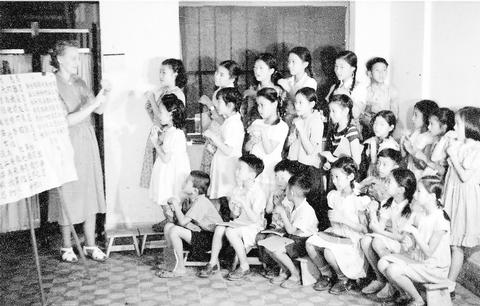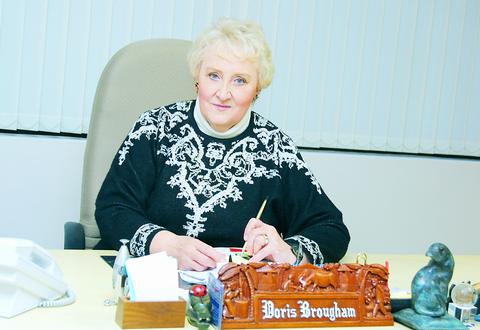In 1951, at age 25, she came alone to help improve the lives of the people of Taiwan.
In 1971, when Taiwan was forced out of the UN and some people were scrambling to emigrate, she didn't think about packing up and leaving. Nor did the disastrous 921 earthquake shake her desire to help the people of Taiwan.

PHOTO COURTESY OF DORIS BROUGHAM
Now, more than 50 years after she first set foot in Taiwan, Doris Brougham is still ceaselessly pouring her time and energy into enhancing the English-language skills of the nation's populace.

PHOTO COURTESTY OF DORIS BROUGHAM
Known to her students as teacher Peng Meng-hui (彭蒙惠老師), Brougham is the founder of the nation's most popular English radio program, Studio Classroom (空中英語教室), and magazine -- Let's Talk in English (大家說英語).
Brougham's lifelong dedication to Taiwan and its people has not gone unnoticed. Earlier this month President Chen Shui-bian (
"[Studio Classroom] is an essential classic that young Tai-wanese students cannot do without when studying English," Chen said.
"For 40 years, [Studio Classroom] without doubt, has contributed a lot to advancing Taiwanese youth's global vision, as well as enhancing their English language skills."
Brougham, who was born in Seattle, originally came to Taiwan as a missionary. She said she never intended to work in media and that the success of the Studio Classroom since its establishment in 1962 was a great surprise to her.
"It all started when I thought broadcasting would be a great evangelical way to reach people," Brougham said in fluent Mandarin, recalling her time with the Aborigines in Hualien, a mountainous region in eastern Taiwan where she spent her first three years in Taiwan.
During this time, Brougham also learned to speak the Ami language spoken by the Aboriginal tribe of the same name.
"With permission from Tong Chien-kuan (
"I set up a simple studio in my place and started producing a program that consisted of music, skits and evangelical messages.
"Coincidentally," Brougham said, "shortly afterward, the Ministry of Education wanted broadcasting stations to produce educational programs. It was then that I got an invitation from Fu Hsing Broadcasting Station (
"Having witnessed several times Taiwanese youths having a hard time communicating -- and thus losing the opportunity to integrate internationally because of their inadequate English -- I realized there was a strong need to teach them English."
Since Studio Classroom's debut 40 years ago, it has become one of the main supplements to many of Taiwan's English speakers in their English studies.
In 1994, Brougham set up the Doris Brougham Scholarship to award academic excellency.
However, because of the nation's rigid Immigration Law (入出國及移民法), Brougham, like Bjarne Gislefoss (徐賓諾), former superintendent of the Puli Christian Hospital, still can't obtain permanent residency despite dedicating herself to Taiwan for more than 50 years.
"I understand the government has its concerns and reasons to make the law the way it is," Brougham said.
"But it is true that it would have been much more convenient [to have permanent residency] without having to keep an eye on the calendar and keep track of the time until I have to renew my visa."
Brougham added that the visa issue did not bother her much and she wished to go on contributing what she could to English-language education in Taiwan.
She said Taiwan was an extremely adorable place and that she was happy to be able to give something back to Taiwan.
"I want to do what I can to help out more needy people and make people happy."

Three Taiwanese airlines have prohibited passengers from packing Bluetooth earbuds and their charger cases in checked luggage. EVA Air and Uni Air said that Bluetooth earbuds and charger cases are categorized as portable electronic devices, which should be switched off if they are placed in checked luggage based on international aviation safety regulations. They must not be in standby or sleep mode. However, as charging would continue when earbuds are placed in the charger cases, which would contravene international aviation regulations, their cases must be carried as hand luggage, they said. Tigerair Taiwan said that earbud charger cases are equipped

Foreign travelers entering Taiwan on a short layover via Taiwan Taoyuan International Airport are receiving NT$600 gift vouchers from yesterday, the Tourism Administration said, adding that it hopes the incentive would boost tourism consumption at the airport. The program, which allows travelers holding non-Taiwan passports who enter the country during a layover of up to 24 hours to claim a voucher, aims to promote attractions at the airport, the agency said in a statement on Friday. To participate, travelers must sign up on the campaign Web site, the agency said. They can then present their passport and boarding pass for their connecting international

UNILATERAL MOVES: Officials have raised concerns that Beijing could try to exert economic control over Kinmen in a key development plan next year The Civil Aviation Administration (CAA) yesterday said that China has so far failed to provide any information about a new airport expected to open next year that is less than 10km from a Taiwanese airport, raising flight safety concerns. Xiamen Xiangan International Airport is only about 3km at its closest point from the islands in Kinmen County — the scene of on-off fighting during the Cold War — and construction work can be seen and heard clearly from the Taiwan side. In a written statement sent to Reuters, the CAA said that airports close to each other need detailed advanced

WEATHER Typhoon forming: CWA A tropical depression is expected to form into a typhoon as early as today, the Central Weather Administration (CWA) said yesterday, adding that the storm’s path remains uncertain. Before the weekend, it would move toward the Philippines, the agency said. Some time around Monday next week, it might reach a turning point, either veering north toward waters east of Taiwan or continuing westward across the Philippines, the CWA said. Meanwhile, the eye of Typhoon Kalmaegi was 1,310km south-southeast of Oluanpi (鵝鑾鼻), Taiwan’s southernmost point, as of 2am yesterday, it said. The storm is forecast to move through central